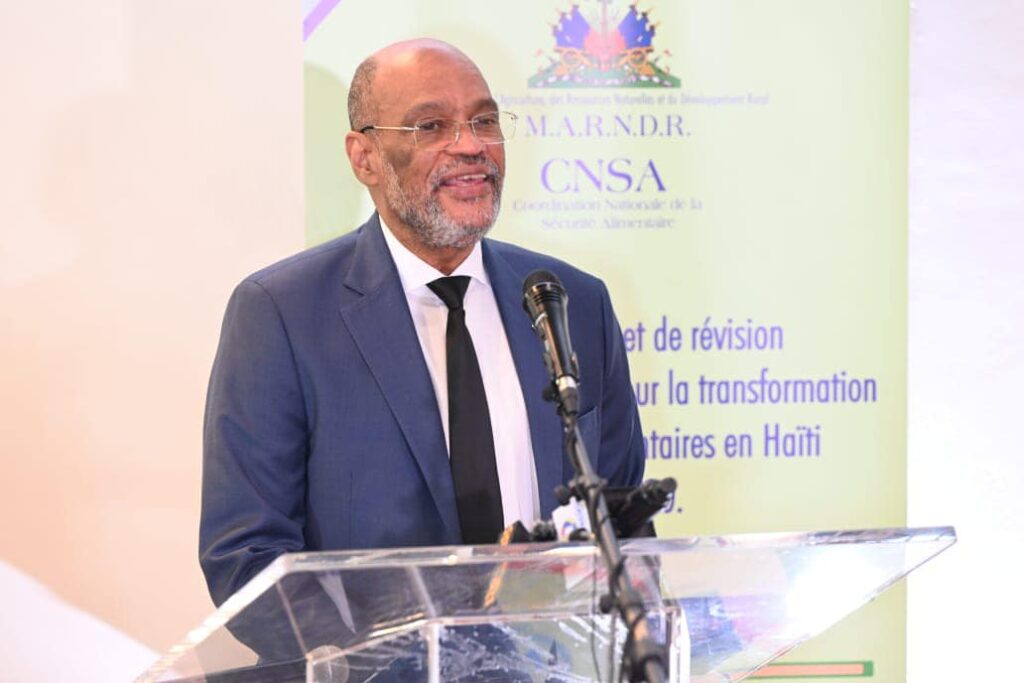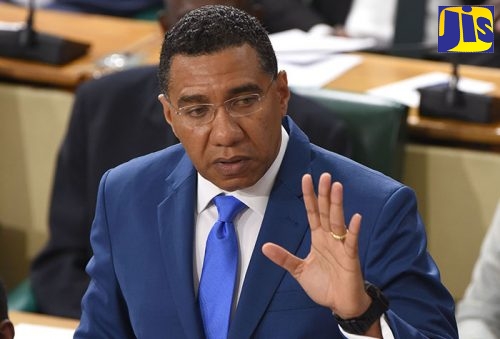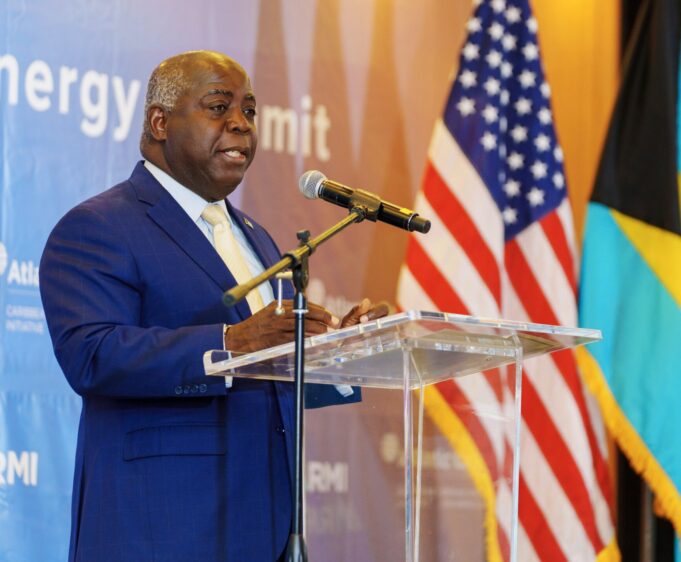In the face of acute turmoil in troubled Haiti, Haitian stakeholders, including its acting prime minister Ariel Henry, met in Kingston, Jamaica, at the invitation of the Caribbean Community (CARICOM) to address the ongoing problems in the country. The dialogue was facilitated by the Eminent Persons Group, recently established by CARICOM as a focus group for Haiti.
The June 11-13 meeting sought to hold inclusive dialogue among Haitian stakeholders to find solutions to the “protracted multi-dimensional crisis” the country has been mired in, said a June 15 statement from the Group. But due to a worsening humanitarian crisis, violence, and requests since October by Mr. Henry for foreign intervention, the meeting warranted careful monitoring, said observers.
“The important thing to understand is that Haiti has three neocolonial masters … the U.S., Canada and France,” said Kim Ives, a commentator and editor of Haiti Liberte. “France is not that much part of this most recent offensive, but the U.S. and Canada are both very engaged in trying to get their troops into Haiti to buckle it down,” Mr. Ives told The Final Call.
He explained the penchant for militarization is to thwart a “burgeoning revolution” actively growing among armed masses in Haiti’s shanty towns aiming to overthrow the “existing neo-colonial order” whom they back.
Another reason the West continues to interfere, Mr. Ives pointed out, is the growing influence of China in the region—particularly in the neighboring Dominican Republic. Beijing is fostering relationships with Latin American and Caribbean nations for its Belt and Road initiative. As of 2023, some 21 countries in Latin America and the Caribbean have signed up to the initiative. Ten of those are CARICOM nations.

“So, we see the U.S. very alarmed by this development. They want to remain the neo-colonial master,” reasoned Mr. Ives.
A takeaway from the CARICOM meeting was Mr. Henry agreeing to form a power-sharing government in hopes of quelling the security crisis and organizing elections for later this year. Haiti has not had a functioning government for several years and it sunk deeper into instability when its president, Jovenel Moïse, was assassinated in July 2021. The circumstances around the killing still remain unclear.
Before his assassination, Mr. Moïse extended his own rule and Mr. Henry, becoming the slain leader’s successor, was never ratified by law. He is seen as illegitimate by many Haitians who question the constitutional validity of Mr. Henry’s government, which until now had no election timetable. Since the last 10 legislators quit earlier this year, Haiti has had zero elected officials and no functioning institutions.
To add lighter fluid to the burning grill, Mr. Henry’s request in October 2022 for foreign military intervention was widely seen as an effort to shore up a weak and unelected government.
If Haiti is seen only from the lens of mainstream media, people are left wondering, “what’s wrong with Haiti?” and “why is there never-ending chaos in the small Caribbean country?” Haiti watchers and experts say the answer to these questions is clear: the United States, Canada, France and others that make up a coalition of the wicked, are what’s wrong with Haiti.
These proponents of occupation and White supremacy partnered with wealthy local minions are what has plagued the nation of nearly 12 million people, critics argue. These forces are at the root of Haiti’s spiraling crisis and dishonestly pay lip service to solve the crises directly or indirectly, which is how Mr. Ives saw the Kingston meeting. “The U.S. can’t come in openly,” said Mr. Ives. “Because people are already very resentful of the way they conducted past interventions.”
He argues the U.S. and Canada are trying to recruit Caribbean nations into a coalition of the willing to be a front for them. But CARICOM rejected multinational boots in Haiti despite the pressure.
Prime Minister Philip Davis of the Bahamas and chairman of CARICOM said, there is “no appetite” among CARICOM nations for sending forces. CARICOM’S concern is establishing a mechanism to assist the Haitian national police in restoring law and order.
He hopes troops on the ground will not be necessary and doubts the appetite for any of the superpowers or anyone to place boots on the ground at this time. “We think it should be a Haitian solution,” Mr. Davis said on June 15 reported The Tribune, of The Bahamas.
While most CARICOM countries rejected military intervention in Haiti, in February, Jamaica’s Prime Minister Andrew Holness affirmed Jamaica’s willingness to take part. He said, “Jamaica would be willing to participate in a multinational security assistance deployment to Haiti under the appropriate jurisdictional parameters.” He explained that both the Jamaica Constabulary Force and Defense Force have started to plan for such eventuality as part of regular monitoring and response capabilities.

Photo: opm.gov.jm
One week before the Kingston meeting, U.S. Vice President Kamala Harris met with Caribbean leaders in the Bahamas on June 8 and repeated the call for multi-national intervention in Haiti.
For some observers, the push is redolent to Washington’s playbook for the invasion of Grenada in 1983. The U.S. located willing countries to be the outward face, while Washington was the hidden hand and power behind the move.
“Essentially, this whole CARICOM meeting, the real powers behind the scene,” said Mr. Ives, “were the U.S. and Canada who were sort of the 64,000-pound gorilla in the room,” he added.
The U.S. and its band of belligerents known as “The Core Group,” comprising of ambassadors of Germany, Brazil, Canada, France, and Spain, along with representatives of the United Nations, the Organization of American States, and the European Union, continues to push up on Haiti under the pretext of fighting gangs.
Canada has recently deployed surveillance aircraft over Haiti at the behest of the U.S. and its embedded Haitian authority. It must be remembered that the U.S. and Canada partnered on Haitian interventions in 1994 and 2004, overthrowing the popular government of Jean Bertrand Aristide.
Haiti advocates blame the current downward slope of Haitian affairs on the long legacy of interference rooted in centuries of foreign meddling. Considering the grim circumstances of Haiti, these longtime meddlers couldn’t care less about Haitians living in bidonvilles (slums) and languishing in abject poverty. But the small island nations of CARICOM have an interest in making sure Haiti becomes stable.
“The conditions in Haiti are not getting any better … they are getting worse,” said Joseph Makhandal, an attorney and Nation of Islam student minister who serves as its representative to Haiti.
Dialogue is always welcomed, especially now when the political, social and economic instability has reached an impasse, explained Mr. Makhandal. The need for dialogue is paramount, he added. “But the problem becomes, who is managing that conversation and directing the dialogue?” asked the student minister. “It is really disheartening to see a number of ‘stakeholders’ from Haiti in Jamaica. … And yet, they could not meet amongst themselves in Haiti,” said Student Min. Makhandal.
“Who directed them to go there and have a tête-à-tête amongst themselves to address the problems? We all know the answer to that question,” he retorted. “Unfortunately, Haiti is not a sovereign state … an independent state.” He is not confident something progressive will come out of the Kingston meeting that will benefit the masses of Haitians suffering marginalization, neglect, oppression and abuse.
Other observers say the real solution is revolutionary, which would mean breaking away from the imperialist paradigm. Meddling is an old strategy where the U.S. and its cast of imperialists crawl deep within the internal affairs of a nation.
Everywhere America felt they needed “regime change,” they already hand-picked persons they felt would be amenable to America’s foreign policy objectives. America instigates instability. Haiti has been a poster child for such policies on the wall of imperialists, observers argue.
“America is not interested in a democratically elected government that produces a government that she is not in control of and cannot have free access to the natural resources of that nation,” said the Honorable Minister Louis Farrakhan, in Part 34 of “The Time and What Must Be Done,” a weekly broadcast that originally aired in 2013. “The C.I.A. (Central Intelligence Agency), the N.S.A. (National Security Agency) and the government of the United States of America would engage covertly, in creating and exploiting differences that naturally exist in all nations,” said Minister Farrakhan.
They place money behind these differences that would one day explode into possible civil war, fratricidal conflict, death and destruction. All based on the lies of this mischief-maker and universal blood shedder, the Minister explained.
It is “hands off Haiti,” Student Min. Makhandal argued. The U.S. policy was, “not to help Haiti, but pretend to help Haiti,” he added. “We need to put a stop to that pretentious policy” and get to real solutions, “not circus meetings here … under the watch of so-called superpowers.”
—Brian E. Muhammad, Staff Writer













